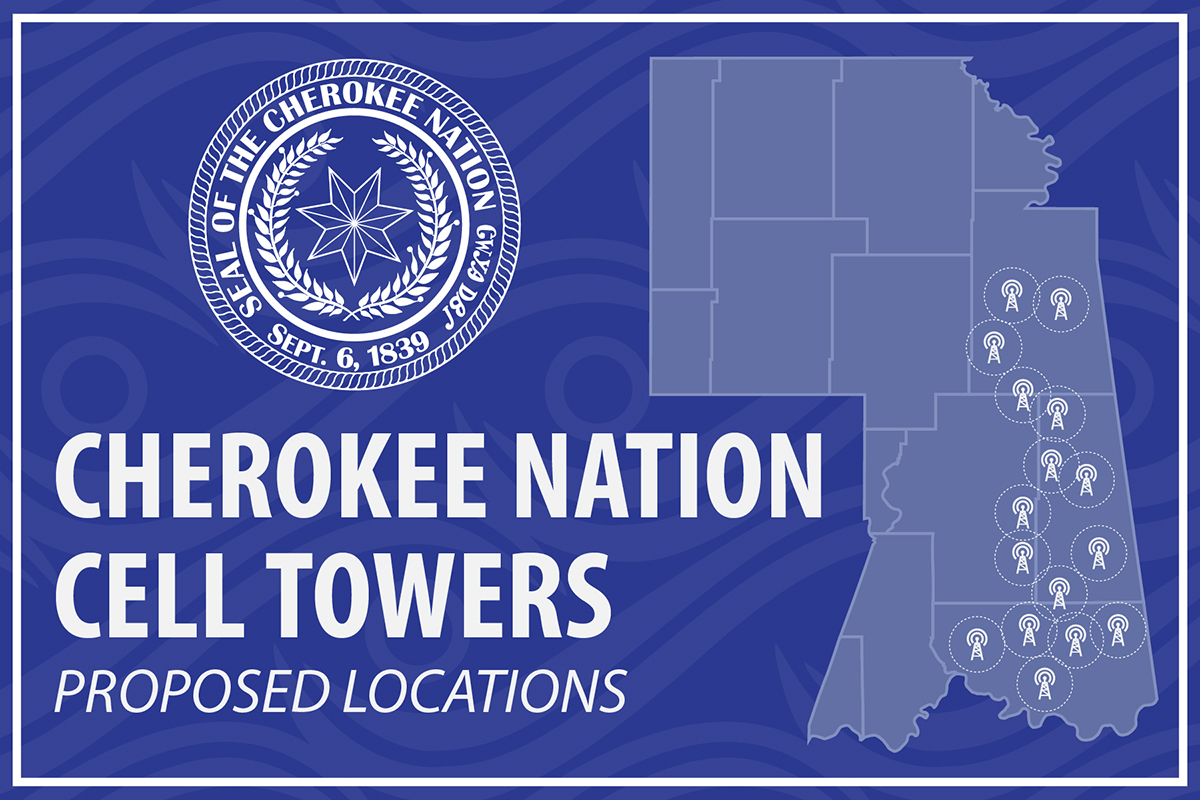TAHLEQUAH, Okla. – The Cherokee Nation is constructing 15 new cell towers in 16 rural Cherokee communities and creating a broadband Internet network to help bridge the digital divide where cell service and broadband infrastructure are lacking or nonexistent. Cherokee Nation expects to invest more than $80 million into the effort over the next three years.
Construction of the 15 cell towers and broadband network is part of Principal Chief Chuck Hoskin Jr. and Deputy Chief Bryan Warner’s commitment to ensuring rural Cherokee communities have access to improved connectivity.
“In the 21st Century, cell service and broadband Internet are crucial for Cherokee families seeking employment and educational opportunities, healthcare services, and a better quality of life,” Chief Hoskin said. “A few years ago, COVID-19 highlighted the critical connectivity needs for Cherokee communities across portions of the Cherokee Nation Reservation, particularly those where high numbers of Cherokee speakers reside. Installation of a cell tower in the Cherokee community of Kenwood in 2023 has proven to be a model for overcoming these barriers, and it is a model worthy of repeating. These 15 new towers and the growth of the first Cherokee Nation-owned broadband network are major milestones in our efforts to connect these 16 rural Cherokee communities with permanent solutions.”
The 15 new cell towers will tentatively be spread throughout Adair, Delaware, Cherokee, and Sequoyah County communities: Belfonte, Bell/CC Camp, Brent, Brushy, Chewey, Christie, Dry Creek, Eucha, Greasy, Marble City, Oakhill/Piney, Oaks, Proctor, Tailholt, and Vian, with parts of the broadband network also crossing into Mayes County. The network also includes the Kenwood cell tower constructed by the Cherokee Nation and AT&T through a historic partnership in 2023.
Following the construction of the Kenwood cell tower, Chief Hoskin announced a larger broadband initiative at his September 2023 State of the Nation Address.
Since that time, planning has been underway to identify communities and potential partners for what will be the largest effort to improve broadband connectivity in the tribe’s history.
Engineers from Entrust Engineering will begin field work surveys within the 16 impacted communities this month in order to determine specific site locations for each of the cell towers. During this field work, residents of these communities may experience field workers throughout the communities taking photographs or completing other components of the survey process. Each will be wearing protective vests that identify who they are and the name of their company.
“The impact of cell service and broadband Internet access on Cherokee communities cannot be understated,” Deputy Chief Warner said. “Too many Cherokee citizens have been isolated from so many opportunities simply due to a lack of cell service or broadband Internet. But we’re changing that. Our success in Kenwood last year is a model for all of Indian Country and beyond and has shown us that by working together, we can make sure no community, no family, no individual is left behind.”
Along with building new cell towers and creating its own broadband network in Cherokee communities, the Cherokee Nation also worked with AT&T in 2023 to open the tribe’s first Connected Learning Center, located at the J.W. Sam-Gadusi building in Catoosa. The center is a dedicated space providing Internet access and educational tools to Native citizens and community members who face connectivity barriers.
In 2020, Cherokee Nation was awarded a federal broadband grant to evaluate broadband expansion within Cherokee communities, awarded through the U.S. Department of Interior’s Indian Affairs Office of Indian Energy and Economic Development. The tribe was also recently awarded nearly $400,000 from the National Digital Inclusion Alliance to hire a fulltime digital navigator to focus on digital equality efforts through the tribe’s reservation.
In addition to those federal grants, the $80 million broadband initiative is funded through American Rescue Plan Act (ARPA) funds under the tribe’s “Respond, Recover and Rebuild Plan.”
Cherokee Nation is also seeking proposals from qualified companies to design and build the 15 cell towers. The RFP solicitation closes March 5 and is available on the tribe’s procurement website, Cherokeebids.org.
Through the COVID-19 pandemic, the need for affordable, reliable connectivity became extremely amplified. In late 2020 the tribe installed 35 drive-up WiFi locations and deployed nearly 11,000 hotspots to Cherokee families.

